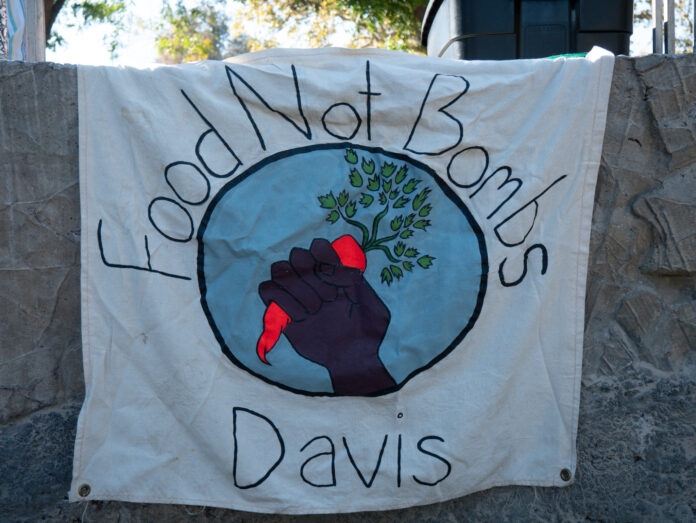Volunteers continue operations of historic Food Not Bombs chapter in Davis
By LAILA AZHAR — features@theaggie.org
Boxes of fruit salad, rice and split-pea stew stacked on a ledge in Central Park don’t exactly seem like the hallmarks of a terrorist group. But Food Not Bombs, the organization behind this food distribution program, has been called exactly that by some government officials
When Brian Fieganbaulm was arrested at an occupation attempt of the Seabrook Nuclear Power Station in 1980, his friends attempted to raise money to pay for his legal fees by holding bake sales. Protesting led to social services and an increasing military budget. They dressed up as generals, displayed a poster that read, “Wouldn’t it be a beautiful day if the schools had all the money they needed and the air force had to hold a bake sale to buy a bomber?” and told people they were raising money to do just that — buy a bomber.
While they didn’t make much money, they caught people’s attention. At their next demonstration, the group set up a fake soup kitchen outside of a bank stockholder’s meeting — insinuating that this bank’s policies resembled the banks that caused the Great Depression. Not wanting the food to go to waste, they communicated the nature of the protest to the local homeless community and were able to share food with over 70 people.
And thus, Food Not Bombs was born. The organization collects food that would otherwise have been discarded from local grocery stores, bakeries and produce markets and distributes it to members of the community. From their inception, political action — specifically anti-war action — has been central to the group. As their mission statement puts it, “When a billion people go hungry each day, how can we spend another dollar on war?”
This commitment to political action alongside food distribution is central to a distinction the group makes. “Even though we provide meals and groceries to thousands of people,” they clarified on their website, “we are not a charity.” Rather, Food Not Bombs is a mutual aid group.
Mutual aid groups operate under the idea that current systems of power aren’t doing enough to meet people’s basic needs and that communities should come together to support one another.
It is exactly this involvement in politics that has led to surveillance by the U.S. government. Food Not Bombs has protested cities’ bans on groups feeding more than 25 people at a time without a permit, stating that “food is a right, not a privilege,” earning them the title of “food terrorists” from Orlando Mayor Buddy Dyer.
The organization was included on an FBI counterterrorism official’s list of “groups that people intent on terrorism might associate with.” Their meetings have repeatedly been infiltrated by law enforcement officials; their houses have been raided, their ties to other activist groups investigated. Co-founder Keith McHenry claims to have been arrested nearly 100 times for work relating to Food Not Bombs.
This intense suppression is the direct result of the financial interests of the U.S. government, according to the organization.
“Military contractors are worried that we might influence the public to realize our taxes could be spent on human needs instead of war,” they said. “Since we will provide food wherever and whenever it is needed, this interferes with the government’s ability to use food for social control.”
Despite the intense backlash they’ve faced, today Food Not Bombs operates over 500 chapters, including one here in Davis. The Davis Food Not Bombs chapter has been serving free vegan meals to the community on and off since 1996. Currently, the group can be found in Central Park on the 2nd and 4th Sundays of every month.
As Josh Redman, a volunteer with the group, described the work: “We collect donations from local farms, the farmer’s market and the food co-op and then we get together and cook a vegan meal and come out and share it at the park.”
Groups like Food Not Bombs help target a pressing issue in Davis: food insecurity. Defined as “a lack of consistent access to enough food for every person in a household to live an active, healthy life,” a study by UC Davis researchers found that 45% of undergraduates at UC Davis experience food insecurity.
“Food access and food insecurity are problems that can make or break a community,” first-year political science major Reena Panikar said. “Food Not Bombs gives people a crucial resource that they need.”
Staying true to the organization’s activist history, Davis Food Not Bombs has collaborated with clubs at UC Davis, such as Cops off Campus and Students for Reproductive Freedom. The group also works closely with other mutual aid organizations providing food to Davis residents. For example, the Davis Food Co-op, a community-owned grocery store, is one of the providers of food for Davis Food Not Bombs. Food Not Bombs has also provided food for the co-op’s “Freedge,” which is exactly what it sounds like: a fridge full of free food.
The spirit of community and solidarity are evident from the way Food Not Bombs volunteers talk about other mutual aid resources in Davis. “There’s lots of other food in town too,” Redman said, eagerly directing me to more resources. “The [Davis] Night Market is here Monday 9-11, there’s a whole bunch of things.”
Volunteering for a group that provides food to Davis can be a powerful way to help one’s community. As first-year international relations major Aminah Syed put it, “Volunteers are united by their passion for change and empathy for marginalized communities. It’s a perfect way to find like-minded people who are committed to the same causes as you.”
For students who want to get involved with Food Not Bombs, Redman said, “I would encourage people to come to a serving and meet people and talk there. There’s lot to do.”
Written by: Laila Azhar — features@theaggie.org




